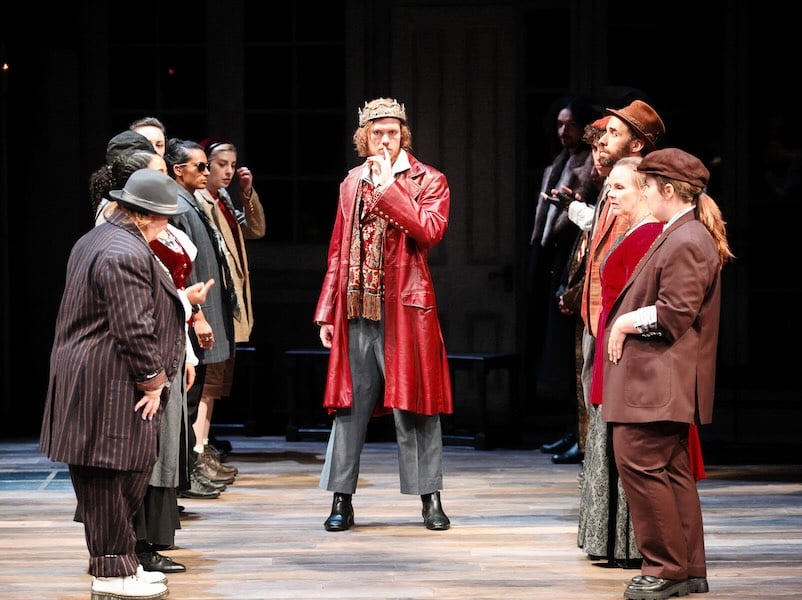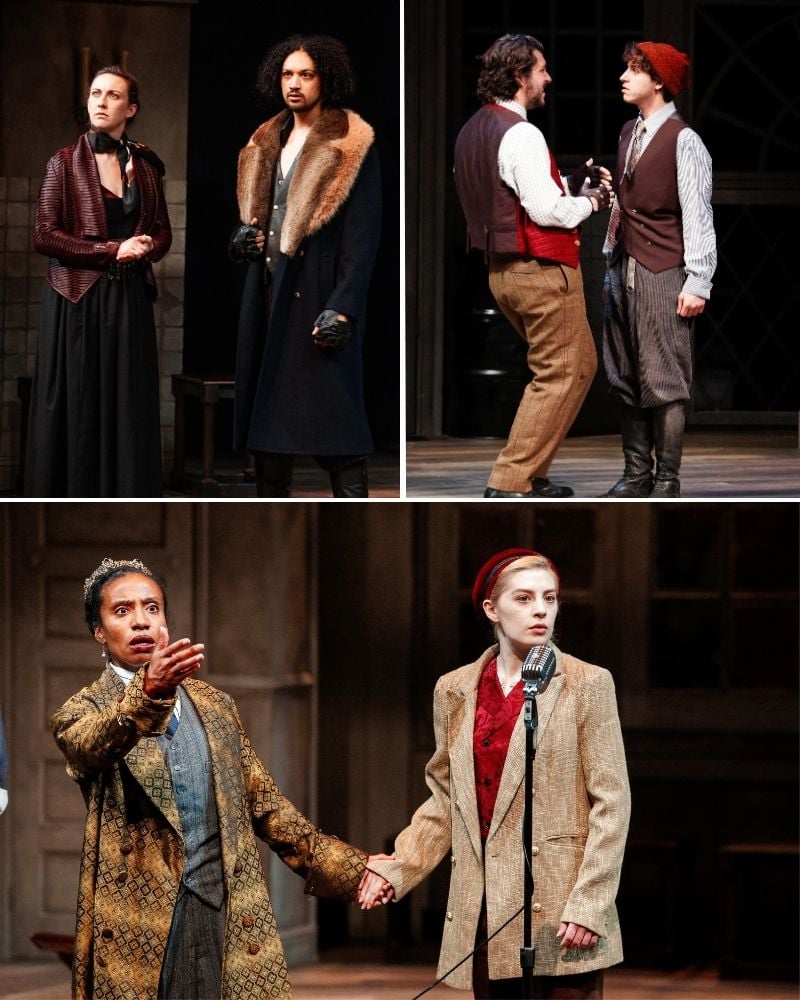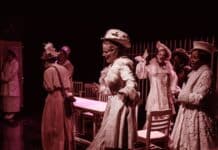King John, by the Shakespeare Theatre Company Academy, is all about power. Who has it, who wants it, and what they are willing to pay for it.
In Director Aaron Posner’s introduction to the script, he lets us know that comparisons to our current chaotic era are encouraged. “Unbridled amassing of Power and Wealth” — check! “[B]astards, rivalries, revolts, counter-revolts” — check! And “preening, plotting, power-hungry” families — check!
Posner’s lighthearted Prologue, in which the characters introduce themselves and their relationships, sets the tone of the production — a mixture of contemporary (lip-synched music by, among others, Billie Eilish, The Killers, Lincoln Park) and timeless (well, it is Shakespeare).

The text is interspersed with cleverly chosen musical numbers — Eilish’s “You Should See Me in a Crown” is one example. Choreographer Nikki Mirza’s work is astonishingly compelling, and fits in beautifully with the music (composer and sound designer is Matthew M. Nielson).
King John (Eric Lane), England’s present king, was the younger brother of Richard I (Coeur de Lion), a kind of JFK figure, handsome, accomplished, and a noted military leader whose shadow hangs over the play. With the support of his mother, Eleanor of Aquitaine (Tracy Coffey), John goes to war against Arthur (Sadie O’Conor), his nephew. Arthur has a claim to the throne through his father, John’s brother Geoffrey. Arthur is backed by King Philip II of France (Amber Mayberry). In the first scene, Philip’s emissary Chattilion (Sydney Sinclair) asks John to give up his kingship in favor of Arthur. King John refuses. Chattilion will convey John’s answer to King Philip — the French will not back down.
Eric Lane as John is masterful in his portrayal of John’s descent from a capable, aggressive king into a would-be murderer and ultimate victim. Tracy Coffey as Queen Eleanor, one of the most powerful women of the 12th century, has the flamboyant charm and political savvy one would expect from this remarkable Queen. As the young and fragile Arthur, O’Conor has a touching innocence, which evolves into heartfelt determination.

In contrast to John, whose machinations are increasingly unsavory, there is the Bastard (Sam Rodd), the irreverent, illegitimate son of Coeur de Lion, whom King John and Queen Eleanor immediately befriend. (As in King Lear, the Bastard is more intriguing than the actual heir.) Rodd’s Bastard becomes embroiled in the vortex of misinformation and moral desperation that permeates John’s world. The Bastard’s conscience, though flawed, will be one of the only lodestars in the kingdom’s night sky.
In his monologue at the end of Act II, the Bastard echoes one of the central themes of the play. inveighing against Commodity, “the bias of the world.” Still, with characteristic irony, he adds:
BASTARD: Well, whiles I am a beggar, I will rail
And say there is no sin but to be rich;
And being rich, my virtue then shall be
To say there is no vice but beggary.
Since kings break faith upon commodity,
Gain, be my lord, for I will worship thee.
The sound of drums and “Money” by Pink Floyd follow.
There are victories — the Bastard succeeds in killing the Duke of Austria (Ali Karambash), who killed his father Richard. Defeats — Hubert (Elizabeth Loyacano), John’s loyal supporter, fails in his gallant attempt to save Arthur, with heartbreaking consequences. Most of all, there are dizzying reversals, which reveal unexpected heroism and villainy.
Two women, one formidable (Queen Eleanor) and one brittle (Constance) are at odds throughout. Eleanor fights furiously for her son John. Constance (Molly Malone) is overwhelmed with fear for hers, Arthur. Coffey as Eleanor and Malone as Constance clash memorably in one scene. During Constance’s terrifying episode of madness, Malone’s anguish has a visceral impact. “I am not mad!” she cries, which is possibly the maddest statement of all.
For better or worse, everyone has to make excruciating moral choices. Eric Lane as John is sinister when he suggests that Hubert kill Arthur, and even more sinister when he attempts to obtain plausible deniability. The stakes are high and the tension is palpable. Which comes first: public duty or private ethics? Loyacano’s Hubert picks one alternative. The Machiavellian Pandulph, the Papal Legate (Maryanne Henderson), picks another.
Lane’s King John and Mayberry’s King Philip II argue like typical politicians. Mayberry is especially inventive vocally, and Lane’s physicality heightens the expression of his moods. The two fight fiercely for the microphone as they plead their cases in front of the disputed city, Angiers.
It is a Citizen (Cammiel Hussey) high above on the ramparts who offers a solution: marriage between King John’s niece Blanche (Layali Aljirafi) and the Dauphin of France (Reese Cowley). (Hint: it doesn’t work out.) Blanche has a nifty musical number of her own, “I’m Just a Girl” by No Doubt, which she performs with aplomb. At one point she satirizes the whole concept of girliness, as she leans on the Dauphin’s shoulder and looks up at him a bit too adoringly. Cowley’s Dauphin, flung from one crisis to another, possesses effectiveness and passion. Alex Ross as Faulconbridge, the Bastard’s younger brother, has an affecting air of vulnerability, accompanied by a stammer.

This King John is different. Posner’s adaptation is fresh and original. The production is forcefully played and full of unusual touches. King John’s lords, Salisbury (Edie Backman), Bigot (Michael Burgos), and Pembroke (Cammiel Hussey) defend their changes of allegiance with alacrity. Some characters have been cut (looking at you, Lady Faulconbridge), but that does not interfere with the overall effect. The battle scenes (fight director is Robb Hunter) are vivid, full of action, and highly suspenseful.
Costumes by Becca Janney are delightfully eclectic. The handsome set, by Andrew Boyce, is from STC’s previous production in the Klein, Frankenstein, and its castle-like ambiance works beautifully. Minjoo Kim is responsible for the especially fine lighting design.
King John has never been a popular king. The play itself goes in and out of fashion. But one thing is sure. The study of power, in whatever century, is always in style. And in some ways, it is always the same.
Running Time: Two hours and 30 minutes, including one intermission.
King John plays through July 26, 2025, in rep with The Taming of the Shrew, Or, Petruchio Is Kated, presented by the Shakespeare Theatre Company Academy performing at the Michael R. Klein Theatre, 450 7th Street NW, Washington, DC. Tickets ($20) are available at the box office, online, by calling 202-547-1122, or through TodayTix.
Performance Dates
JUL 23 at 7:30pm
JUL 25 at 7:30pm
JUL 26 at 7:30pm
The full cast and creative team credits can be viewed here (scroll down).
King John
By William Shakespeare
Directed by Aaron Posner
CAST
King John: ERIC LANE
Philip the Bastard; SAM RODD
King Philip II of France: AMBER MAYBERRY
Louis the Dauphin: REESE COWLEY
Constance: MOLLY MALONE
Arthur: SADIE O’CONOR
Queen Eleanor: TRACY COFFEY
Hubert: ELIZABETH LOYACANO
Cardinal Pandulph: MARYANNE HENDERSON
Lord Bigot: MICHAEL BURGOS
Angiers Citizen/Pembroke: CAMMIEL HUSSEY
Earl of Salisbury/Executioner: EDIE BACKMAN
Chattilion//Count Melun: SYDNEY SINCLAIR
Duke of Austria: ALI KARAMBASH
Blanche: LAYALI ALJIRAFI
Faulconbridge, Prince Henry: ALEX ROSS
CREATIVE TEAM
Costume Designer: BECCA JANNEY
Lighting Designer: MINJOO KIM
Sound Designer & Composer: MATTHEW M. NIELSON
Props Director: LISA ANN BELEY
Fight Director: ROBB HUNTER
COVID Safety: All STC spaces are mask-friendly — meaning all patrons, masks and unmasked, are welcome. Read more about Shakespeare Theatre Company’s Health and Safety policies here.
SEE ALSO:
‘The Taming of the Shrew’ from STC Academy is virtuoso Shakespeare (review by Sophia Howes, July 29, 2025)



